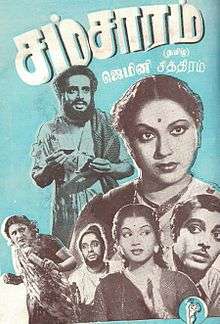Samsaram (1951 film)
Samsaram (transl. Wife) is a 1951 Indian Tamil-language drama film directed by Chandru and produced by S. S. Vasan. A remake of the 1950 Telugu film of the same name, it features M. K. Radha, Pushpavalli, Kumari Vanaja, Sriram, M. S. Sundari Bai, T. R. Ramachandran, D. Balasubramaniam, R. Balasubramaniam, K. N. Kamalam, and Kamalaveni Ammal in lead roles. It was simultaneously filmed in Hindi as Sansar, which Vasan directed.[2]
| Samsaram | |
|---|---|
 Poster of Samsaram | |
| Directed by | Chandru S. S. Vasan (Hindi Version) |
| Produced by | S. S. Vasan |
| Screenplay by | Ki. Ra. |
| Based on | Samsaram (1950) |
| Starring | M. K. Radha Pushpavalli |
| Music by | Emani Sankara Sastry M. D. Parthasarathy (Supervisor) |
| Cinematography | P. Ellappa |
| Edited by | M. Umanath Rao |
Production company | |
| Distributed by | Gemini Studios
|
| Country | India |
| Language | Tamil Hindi |
Plot
A struggling clerk lives with his wife and two children. Their blissful life is threatened with the arrival of his scheming mother and sister. A short time later, the clerk disappears, abandoning his family, and his brother comes to their rescue. Exploiting the fragile situation, mischief makers suggest an immoral relationship between the clerk's brother and wife. Frustrated, the clerk's wife sends her two children to beg on the streets. Several years later, the elder of the two children, now working in a mill, meets a bearded beggar who, unknown to him, is actually his father. He obtains his father a job in the mill, and the family later reunites.
Cast
|
|
|
Production
S. S. Vasan, the owner of Gemini Studios, screened the Telugu film Samsaram for his staff, family and friends. Impressed with the film, he bought the rights to remake it in two languages: Tamil and Hindi. The Tamil remake shared its title with the Telugu film, while the Hindi version was titled Sansar. Both versions were launched simultaneously; Chandru, the chief editor of Gemini, directed the Tamil version. Because South Indians actors of the era could not speak Hindi fluently, Vasan had the voices of the South Indian cast dubbed for Sansar, which he directed.[2][3][4] Choreography was handled by Jayashankar Nayak, A. K. Chopra and Natanam Nataraj.
Table of Samsaram and Sansar Casts
| Samsaram (Tamil) | Sansar (Hindi) |
|---|---|
| Manjula (Pushpavalli) | Lakshmi (Pushpavalli) |
| Gopu (M. K. Radha) | Narayan (M. K. Radha) |
| Kamala (Kumari Vanaja) | Kamala (Vanaja) |
| Venu (Sriram) | Madan (Swaraj) |
| Kamakshi (Sundari Bai) | Ganga (Gulab) |
| Seetharam (T. R. Ramachandran) | Sitaram (Agha) |
| Kanakasabapathy (D. Balasubramaniam) | Jugalji Seth (J. S. Casshyap) |
| Doctor (R. Balasubramaniam) | Doctor (David) |
| Chellamma (K. N. Kamalam) | Saraswathi (Meera) |
| Vengamma (Kamalaveni Ammal) | Jamuna (Mohana) |
| Balu (Adult) (Sethu) | Gopi (Senior) (Kazam) |
| Balu (Child) (Anil Kumar) | Gopi (Junior) (Anil Kumar) |
| Saroja (Adult) (Krishnaveni) | Rupa (Senior) (Krishnaveni) |
| Saroja (Child) (Rathnapapa) | Rupa (Junior) (Ratnapapa) |
| Vijay (Mohan) | Vijay (Mohan) |
| Manjula's Father (Rangaswami Iyengar) | Lakshmi's Father (Rangaswami) |
| Kondal Rao (Ramakrishna Rao) | Popatlal (Ramakrishna Rao) |
| Ramaiah (G. V. Sharma) | |
| A. L. Kam (Venkat) | Kamala's Cousin (Venkat) |
| Office Manager (Sadasiva Rao) | Office Manager (Sadasiva Rao) |
| Sub-Inspectors (G. S. Bindumadhavan, Mukharji) | Police Oficers (Rajkumar, Bindumadhavan) |
| Seth (Ishwarlal) | |
| Subanna (Vijaya Rao) | Dinu Bhaiya (Vijaya Rao) |
| Nagamma (Sakku Bai) | Dayavati (Balamani) |
| Car Owner (Ramkumar) | Guest (B. S. Kalla) |
Soundtrack
Emani Sankara Sastry was the music director, and his work was supervised by M. D. Parthasarathy. Kothamangalam Subbu wrote the lyrics. A. M. Rajah made his singing debut with this film, and his song "Samsaram... Samsaram..." became a breakthrough in his career.[2]
| S/N | Song | Singer(s) | Duration(m:ss) |
|---|---|---|---|
| 1 | "Aararo Aararo Arumai Kumara" | P. Leela | 02:35 |
| 2 | "Maanilathil Vidhiyai Ventra" | A. M. Rajah | 02:07 |
| 3 | "Samsaram .. Samsaram" | A. M. Rajah | 02:37 |
| 4 | "Kada Kada Loda Loda Vandi" | A. M. Rajah, Jikki | 04:36 |
| 5 | "Enathu Manam Kanavilum Ninaivilum" | Jikki | 03:09 |
| 6 | "Amma Pasikuthe" | Jikki, Sarojini | 02:53 |
| 7 | "Ezhai Engu Selvaen" | P. Leela | 02:25 |
| 8 | "Avar Mella Mella" | Jikki | 01:23 |
Reception
Both Samsaram and Sansaar were released in 1951 and became commercially successful.[4] According to film historian Randor Guy, the success of the former was attributed to its "emotionally strong and sentimental storyline", elements, and the performances of Radha, Pushpavalli, Sriram, Vanaja, Sundari Bai and Ramachandran. However, journalist Kalki Krishnamurthy gave the film a negative review in his magazine Kalki, where he criticised the song "Amma Pasikkuthey, Thaaye Pasikkuthey" by arguing that "no mother would ever stoop to that level".[2] In Japan, the film was released under the title Such Is Life.[5]
References
- Film News Anandan (23 October 2004). Sadhanaigal Padaitha Thamizh Thiraipada Varalaru [History of Landmark Tamil Films] (in Tamil). Chennai: Sivakami Publishers. Archived from the original on 6 January 2017.
- Guy, Randor (6 December 2014). "Samsaram 1951". The Hindu. Archived from the original on 3 January 2017. Retrieved 2 November 2016.
- Rajadhyaksha, Ashish; Willemen, Paul (1998) [1994]. Encyclopaedia of Indian Cinema (PDF). New Delhi: Oxford University Press. p. 231. ISBN 0-19-563579-5.
- Ashokamitran 2016, p. 41.
- Ashokamitran 2016, pp. 69-70.
Bibliography
- Ashokamitran (2016). Fourteen Years with Boss. India: Penguin Books. ISBN 978-0-14-342329-4.CS1 maint: ref=harv (link)